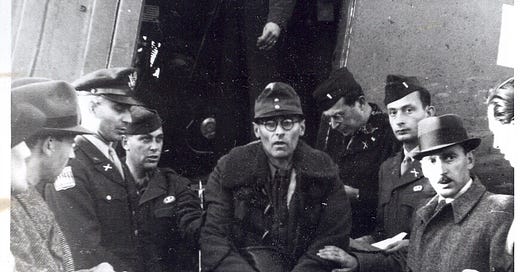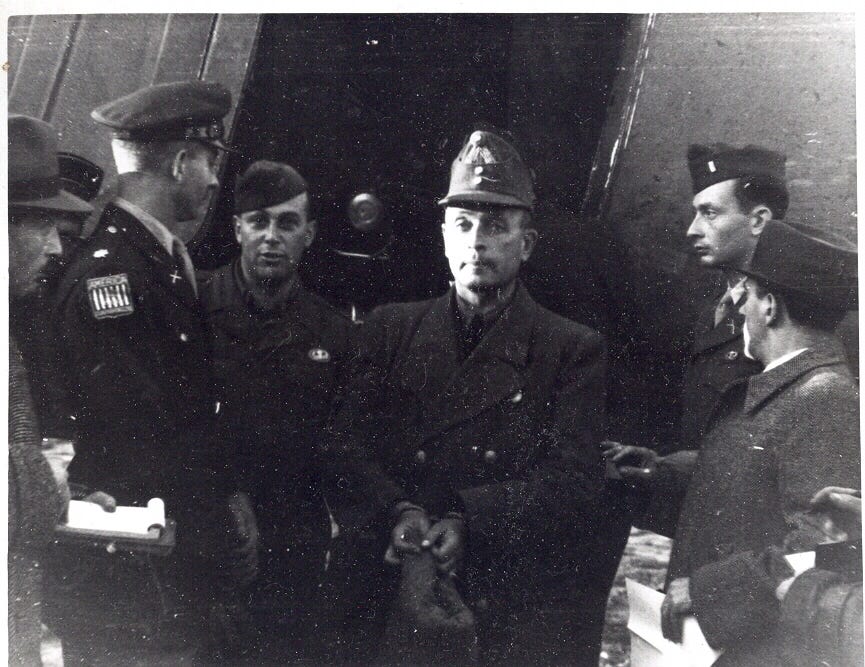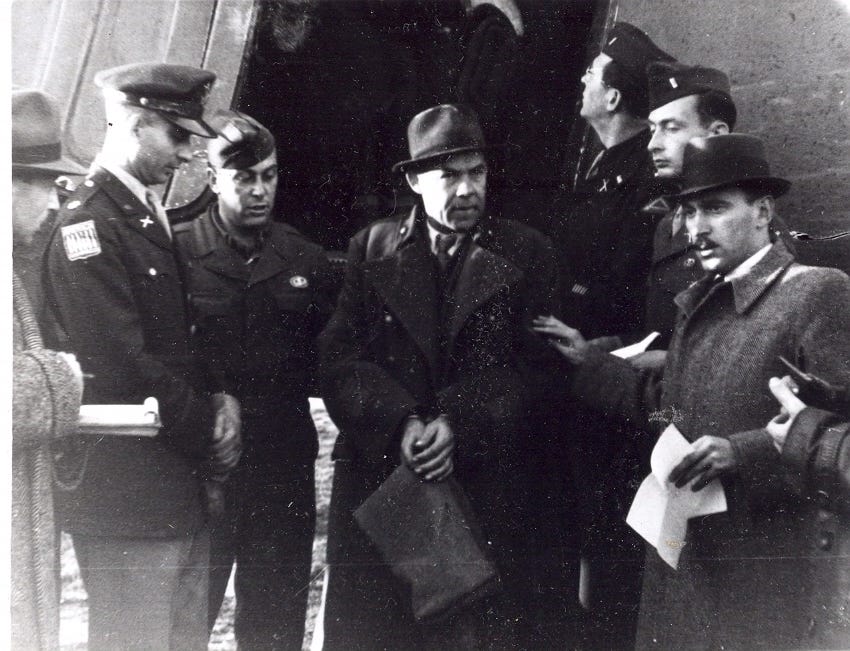After the Allies declared victory on May 8, 1945, Opapa started to make his way back from Slovenia, where he was fighting with the Partisans, to the Allied headquarters in north-eastern Italy. According to the draft of his autobiography, he “hitched a horse-cart ride to Foggia in Italy, our headquarters” where he “was sent to a rest camp.”
It was a short-lived rest:
After two days, I was told that the rest was over. My orders were to go to Austria and take charge of a large army of about 250,000 Hungarians who had fled from the Russians and were encamped on the Austrian countryside. I was flown to Salzburg and given a jeep and a jail.
Unlike his first mission to Austria, which did not go according to plan, this mission was triumphant. It would become one of Opapa’s proudest memories.
I’ll be spending the new few days examining this post-war mission and its implications. But let me begin by skipping to the most important piece of information. Here is how Opapa described it in his autobiography:
With an American sergeant also of Hungarian extraction, we located the Hungarian prime minister, Bela Imredy, a pro-Nazi politician, his cabinet, and the men encamped under their command. I had the privilege of arresting the prime minister under whom I left Hungary and his entire general staff and of taking them back to Budapest for war crimes trials. Imredy was hanged1, the others received various prison sentences.
I remember Opapa talking about this: the moment he came face-to-face with the Hungarian leader who was responsible for the first anti-Jewish laws in Hungary. In Opapa’s words, “a war criminal.”
I found a more extensive description of Imredy’s arrest in an essay that Opapa wrote near the end of his life, entitled “Degrees of Freedom and Emancipation.” In it, Opapa describes how he approached the Hungarian troops and made the “conventional request” to “take me to your leader.”
Here is the full passage:
The leader, it turned out, was Bela Imredy, the last Hungarian Prime Minister who surrendered the county to Hitler and was responsible for many atrocities, in my opinion a war criminal.
I went to the house where Imredy was staying and knocked on the door. Mrs. Imredy came out and asked what I wanted. I said I wanted to see Mr. Imredy. She took a long look at my G.I. uniform and said in a surprisingly calm voice: “Don’t worry, he won’t commit suicide.”
Imredy came out. I asked him to get into my jeep. He obliged. We drove to the jail that had been placed at my disposal by the O.S.S. Next, I organized an Army Air Force flight to Budapest, and notified the Hungarian authorities that I was bringing Imredy back to his home country.
There’s a lot to say about this description. First, the banal action of simply “knock[ing] on the door.” This was no dramatic chase. I imagine most of these post-war arrests were similar: the Nazis and their collaborators knew they had lost and while many tried to hide, and some committed suicide, others knew that there was little for them to do but wait until they were found.
It’s also worth noting that Imredy was not in the woods, or in a cave, or in a hut — he’s in a house with a door.
The next surprise is that it’s not Imredy who opens the door to their house, but his wife. I’ve looked her up and her name was Irén (Irene) Imredy (nee Nelky). She would later emigrate — like so may other Nazis and collaborators — to Argentina, where she lived in Buenos Aires with her son, John Bela Imredy (who was a year younger than Opapa).
Irén Imredy’s response to Opapa is neither terror nor pleading, but rather a resigned confidence. Opapa writes how she “took a long look at my G.I. uniform,” and spoke with a “surprisingly calm voice.” And what did she say? Nothing to defend or protect her husband. Instead: “Don’t worry, he won’t commit suicide.”
She was right, of course, but why does she say this? Did she think he was too cowardly to commit suicide? Had they discussed what would happen when the Allies came to arrest him? Did he think he might stand a chance in court?
In any case, Imredy did not resist arrest. He willingly got in Opapa’s jeep (I wonder where: in the front seat? In the back?) and Opapa drove him to the O.S.S. jail.
From there, Opapa arranged for the Army Air Force to transport him back to Hungary. This is Opapa’s description of their arrival:
When we landed, a delegation, headed by the head of the Secret Police, Peter Gabor, received us at the airport with full media presence. Imredy was immediately arrested, and later, tried, sentenced to death and executed.
Now, this is somewhat speculation, but I think I have identified photographs in Opapa’s possession that document this moment: the moment he landed in Budapest and a “delegation” met them, including Peter Gabor, the head of Secret Police, and a “full media presence.” In these photos, you can see Opapa standing near the exit of a military plane, dressed in his G.I. uniform. Next to him, you can see what look like journalists with notepads. They are all watching as numerous men, dressed in somewhat distinct uniforms and hats, are escorted off the military plane.
If you look closely, the men leaving the plane are all handcuffed:
I haven’t been able to identify the other individuals in these photos (Google images is useless), but I think the cap in the top photo is a Panzer M43 cap, used widely by the German Wehrmacht and the SS during WWII.
I don’t think any of these men are Imrédy, though it’s possible. More likely they are the other Nazis who were arrested and transported back to Hungary to stand trial for their crimes.
Actually, Imrédy was not hanged: he was executed by firing squad. There are photographs of his execution, both before and after, in the US Holocaust Memorial Museum’s archives.







Such a dramatic event, and the photos are quite compelling.